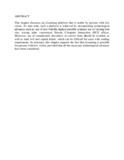Knowledge, Attitude and Practices of health care workers on corticosteroid adverse drug events in rheumatologic, respiratory and dermatologic clinics in a teaching hospital in Nairobi

View/
Date
2015-06Author
Ilovi, CS
Mecha, JO
Kigamwa, P
Mutai, K
Mwachinga, M
Genga, EK
Sheikh, A
Owino, B
[et al.]
Language
enMetadata
Show full item recordAbstract
Background:
Corticosteroids form the
cornerstone of management for a myriad
of rheumatological, dermatological
and chronic respiratory tract diseases.
Whereas these drugs are crucial in
reducing morbidity and mortality, they are
not without inherent grave risks. Health
care workers (HCWs) providing care to
patients on long term corticosteroids are
required to be well versed with these
adverse drug events (ADRs).
Materials and Methods:
Kenyatta
National Hospital, the teaching hospital
of the University of Nairobi, has
established rheumatology, respiratory
and dermatology clinics. As biologic
agents are not yet available in these
clinics, corticosteroids, as well as other
immunosuppressant drugs remain vital
in control of immunological diseases.
HCWs in these clinics were requested to
complete a self-administered open ended
questionnaire assessing their knowledge
of corticosteroid ADRs.
Results:
Sixty-two HCWs were recruited,
comprising of nurses (21%), pharmacy
staff (12.9%) and senior house officers
(66.1%). Majority (74%) had been
stationed for over 1 year at the clinic.
ADRs of corticosteroids:
Median
(IQR) number of correct responses was 6.0 (3.0-9.5). Only 61% identified
>5 ADRs. Proportion of respondents
who documented the various ADRs;
Metabolic disorders- 89%, Cutaneous-
61%, Mineral bone disease- 37%, GIT-
36%, Neuropsychiatric- 32% , Adrenal
suppression-24%, Ophthalmic- 21%,
Myopathy- 18%.
Drugs that potentiate the ADRs of
corticosteroids
: Median (IQR) number
of correct responses was 1.0 (1.0-
2.0). Proportion of respondents who
identified the drugs; Cytotoxics- 34%,
NSAIDs-35%, Anticoagulants- 15%,
Others- 10%.
Advice that should be given to patients
on corticosteroids
: Median (IQR) number
of correct responses was 2.0 (2.0-3.0).
Surveillance for ADRs- 53%, adherence
to duration and dosage-48%, tapering of
corticosteroids- 32%, drug interactions-
16%, drugs to counter corticosteroid
ADRs- 13%, steroid cards- 7%.
Conclusion:
Although HCWs routinely
administer corticosteroids, the awareness
of ADRs and potential drug interactions is
low. This needs to be addressed in order
to ensure adequate surveillance of ADRs
URI
http://www.aflar.net/images/stories/documents/AJR_3_2015_june.pdfhttp://hdl.handle.net/11295/92131
Citation
Ilovi, CS., Mecha, JO., Kigamwa, P., Mutai, K., Mwachinga, M., Genga, EK., Sheikh, A and Owino, B (2015). Knowledge, Attitude and Practices of health care workers on corticosteroid adverse drug events in rheumatologic, respira - tory and dermatologic clinics in a teaching hospital in Nairobi. Afr J Rheumatol 2015; 3(2): 2Publisher
University of Nairobi
Collections
- Faculty of Health Sciences (FHS) [10415]
